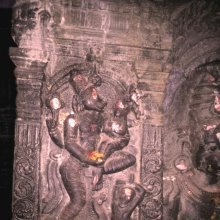Maharshi, Maharishi, Mahaṛṣi, Maharṣi, Mahārṣi: 20 definitions
Introduction:
Maharshi means something in Buddhism, Pali, Hinduism, Sanskrit, Jainism, Prakrit, Marathi, Hindi. If you want to know the exact meaning, history, etymology or English translation of this term then check out the descriptions on this page. Add your comment or reference to a book if you want to contribute to this summary article.
The Sanskrit terms Mahaṛṣi and Maharṣi and Mahārṣi can be transliterated into English as Maharsi or Maharishi or Maharshi, using the IAST transliteration scheme (?).
Images (photo gallery)
In Hinduism
Purana and Itihasa (epic history)
Source: Cologne Digital Sanskrit Dictionaries: The Purana IndexMahaṛṣi (महऋषि).—Mind-born sons of Brahmā, seven in number, like Bhṛgu, Marīci, and Angiras;1 ety. from root ṛṣi gatau—meaning knowledge; great jñānins;2 their role in creation.3
- 1) Brahmāṇḍa-purāṇa II. 32. 89, 97; Matsya-purāṇa 145. 85; 247. 10.
- 2) Brahmāṇḍa-purāṇa II. 6. 71; Vāyu-purāṇa 7. 74; 59. 82 and 89.
- 3) Ib. 7. 75-6.

The Purana (पुराण, purāṇas) refers to Sanskrit literature preserving ancient India’s vast cultural history, including historical legends, religious ceremonies, various arts and sciences. The eighteen mahapuranas total over 400,000 shlokas (metrical couplets) and date to at least several centuries BCE.
Vaishnavism (Vaishava dharma)
Source: Pure Bhakti: Bhagavad-gita (4th edition)Maharṣi (महर्षि) refers to “seer of the Truth. He has seen the worshipable deity of one’s mantra”. (cf. Glossary page from Śrīmad-Bhagavad-Gītā).
Source: Pure Bhakti: Bhajana-rahasya - 2nd EditionMaharṣi (महर्षि) refers to:—A great sage. (cf. Glossary page from Bhajana-Rahasya).
Source: Pure Bhakti: Brhad BhagavatamrtamMaharṣi (महर्षि) refers to:—(also spelled Mahaṛṣi) Great sage. (cf. Glossary page from Śrī Bṛhad-bhāgavatāmṛta).

Vaishnava (वैष्णव, vaiṣṇava) or vaishnavism (vaiṣṇavism) represents a tradition of Hinduism worshipping Vishnu as the supreme Lord. Similar to the Shaktism and Shaivism traditions, Vaishnavism also developed as an individual movement, famous for its exposition of the dashavatara (‘ten avatars of Vishnu’).
Vedanta (school of philosophy)
Source: ORA: Amanaska (king of all yogas): (Advaita Vedanta)Maharṣi (महर्षि) refers to a “great sage”, according to Mādhavavidyāraṇya’s Śaṅkaradigvijaya 5.97.—Accordingly, “I [Śaṅkara] desire to know the basis of Brahman from the great sage (maharṣi) Gauḍapāda, [who was] the student of the son of Vyāsa. Because of my devotion to [this] one aim, I have found you [my guru, Govinda,] who is full of all good qualities, who has obtained the supreme truth and whose greatness extends [throughout the land]”.

Vedanta (वेदान्त, vedānta) refers to a school of orthodox Hindu philosophy (astika), drawing its subject-matter from the Upanishads. There are a number of sub-schools of Vedanta, however all of them expound on the basic teaching of the ultimate reality (brahman) and liberation (moksha) of the individual soul (atman).
In Buddhism
Tibetan Buddhism (Vajrayana or tantric Buddhism)
Source: Wisdom Library: Tibetan BuddhismMahārṣi (महार्षि) refers to a group of deities summoned by the Yamāntaka-mantra and mentioned as attending the teachings in the 6th century Mañjuśrīmūlakalpa: one of the largest Kriyā Tantras devoted to Mañjuśrī (the Bodhisattva of wisdom) representing an encyclopedia of knowledge primarily concerned with ritualistic elements in Buddhism. The teachings in this text originate from Mañjuśrī and were taught to and by Buddha Śākyamuni in the presence of a large audience (including Mahārṣi).

Tibetan Buddhism includes schools such as Nyingma, Kadampa, Kagyu and Gelug. Their primary canon of literature is divided in two broad categories: The Kangyur, which consists of Buddha’s words, and the Tengyur, which includes commentaries from various sources. Esotericism and tantra techniques (vajrayāna) are collected indepently.
Mahayana (major branch of Buddhism)
Source: De Gruyter: A Buddhist Ritual Manual on AgricultureMaharṣi (महर्षि) refers to a “great Ṛṣi” and is used to describe Agastya, according to the Vajratuṇḍasamayakalparāja, an ancient Buddhist ritual manual on agriculture from the 5th-century (or earlier), containing various instructions for the Sangha to provide agriculture-related services to laypeople including rain-making, weather control and crop protection.—Accordingly, “Then Agastya, the Great Ṛṣi (maharṣi), sitting not too far from the Bhagavān, having heard this dhāraṇī, arose from his seat and falling at the feet of the Bhagavān addressed the Bhagavān, ‘O Bhagavān, I will make a beak-sealing for pests of all sorts, malevolent and hostile, poison-holders, destroyers of crops, flowers, fruits, leaves and the best roots; [...]’”.

Mahayana (महायान, mahāyāna) is a major branch of Buddhism focusing on the path of a Bodhisattva (spiritual aspirants/ enlightened beings). Extant literature is vast and primarely composed in the Sanskrit language. There are many sūtras of which some of the earliest are the various Prajñāpāramitā sūtras.
In Jainism
General definition (in Jainism)
Source: The University of Sydney: A study of the Twelve ReflectionsMaharṣi (महर्षि) refers to “great seers”, according to the 11th century Jñānārṇava, a treatise on Jain Yoga in roughly 2200 Sanskrit verses composed by Śubhacandra.—Accordingly, “Connections with pleasing sense objects, whose impressions are full of deceit like dreams, perish immediately. Families, armies, empires, decorations and wealth are asserted by the great seers (maharṣi) as acting like a series of clouds”.
Synonyms: Manīṣi.

Jainism is an Indian religion of Dharma whose doctrine revolves around harmlessness (ahimsa) towards every living being. The two major branches (Digambara and Svetambara) of Jainism stimulate self-control (or, shramana, ‘self-reliance’) and spiritual development through a path of peace for the soul to progess to the ultimate goal.
Languages of India and abroad
Marathi-English dictionary
Source: DDSA: The Molesworth Marathi and English Dictionarymaharṣi (महर्षि).—m S A ṛṣi or saint of a high order. Ex. tujhā vhāvayā sākṣātkāra || ma0 yajiti thōra thōra ||.
Marathi is an Indo-European language having over 70 million native speakers people in (predominantly) Maharashtra India. Marathi, like many other Indo-Aryan languages, evolved from early forms of Prakrit, which itself is a subset of Sanskrit, one of the most ancient languages of the world.
Sanskrit dictionary
Source: Cologne Digital Sanskrit Dictionaries: Shabda-Sagara Sanskrit-English DictionaryMaharṣi (महर्षि).—m.
(-rṣiḥ) A Rishi or saint of a particular order, including Vyasa and others. E. maha for mahat great, and ṛṣi saint: see rājarṣi .
Source: Cologne Digital Sanskrit Dictionaries: Benfey Sanskrit-English DictionaryMaharṣi (महर्षि).—i. e. mahā-ṛṣi, m. A sage of a pre-eminent class, [Mānavadharmaśāstra] 1, 34.
Source: Cologne Digital Sanskrit Dictionaries: Cappeller Sanskrit-English DictionaryMaharṣi (महर्षि).—[masculine] great Ṛṣi.
Source: Cologne Digital Sanskrit Dictionaries: Aufrecht Catalogus CatalogorumMaharṣi (महर्षि) as mentioned in Aufrecht’s Catalogus Catalogorum:—poet. [Subhāshitāvali by Vallabhadeva]
Source: Cologne Digital Sanskrit Dictionaries: Monier-Williams Sanskrit-English Dictionary1) Maharṣi (महर्षि):—[=maha-ṛṣi] [from maha > mah] m. = -rṣi, [Atharva-veda]
2) [=maha-rṣi] [from maha > mah] m. a great Ṛṣi, any great sage or saint ([according to] to [Manu-smṛti i, 34] ten Maharṣis were created by Manu Svāyambhuva, viz. Marīci, Atri, Aṅgiras, Pulastya, Pulaha, Kratu, Pracetas, Vasiṣṭha, Bhṛgu, Nārada, also called the 10 Prajāpatis, q.v.; some restrict the number to 7, and some add Dakṣa, Dharma, Gautama, Kaṇva, Vālmīki, Vyāsa, Manu, Vibhāṇḍaka etc.), [Manu-smṛti; Mahābhārata] etc. ([Indian Wisdom, by Sir M. Monier-Williams 206 n. 1])
3) [v.s. ...] Name of Śiva, [Śivagītā, ascribed to the padma-purāṇa]
4) [v.s. ...] of Buddha, [cf. Lexicographers, esp. such as amarasiṃha, halāyudha, hemacandra, etc.]
5) [v.s. ...] of a poet, [Catalogue(s)]
Source: Cologne Digital Sanskrit Dictionaries: Yates Sanskrit-English DictionaryMaharṣi (महर्षि):—(rṣiḥ) 2. m. A great sage.
[Sanskrit to German]
Sanskrit, also spelled संस्कृतम् (saṃskṛtam), is an ancient language of India commonly seen as the grandmother of the Indo-European language family (even English!). Closely allied with Prakrit and Pali, Sanskrit is more exhaustive in both grammar and terms and has the most extensive collection of literature in the world, greatly surpassing its sister-languages Greek and Latin.
Hindi dictionary
Source: DDSA: A practical Hindi-English dictionaryMaharṣi (महर्षि):—(nm) a great sage (seer).
...
Kannada-English dictionary
Source: Alar: Kannada-English corpusMaharṣi (ಮಹರ್ಷಿ):—[noun] a superior, respectable sage (often used to denote a sage of higher class).
Kannada is a Dravidian language (as opposed to the Indo-European language family) mainly spoken in the southwestern region of India.
Nepali dictionary
Source: unoes: Nepali-English DictionaryMaharṣi (महर्षि):—n. a great saint/sage;
Nepali is the primary language of the Nepalese people counting almost 20 million native speakers. The country of Nepal is situated in the Himalaya mountain range to the north of India.
See also (Relevant definitions)
Starts with: Maharshihridaya, Maharshika, Maharshisamgha.
Ends with: Mardamaharshi, Rishisharman maharshi.
Full-text (+236): Atharvabhuta, Acyutapajas, Acyutamanas, Ayonija, Asuri, Valmiki, Mahavalabhid, Shushka, Brahmarshi, Pushkari, Nidagha, Carushirsha, Angirajva, Sumedhas, Shakayanya, Bhandyayana, Himavant, Kandyayana, Suranemin, Guru.
Relevant text
Search found 74 books and stories containing Maharshi, Maha-rishi, Maha-rshi, Maha-ṛṣi, Maha-rṣi, Maharishi, Mahaṛṣi, Maharṣi, Maharsi, Mahārṣi; (plurals include: Maharshis, rishis, rshis, ṛṣis, rṣis, Maharishis, Mahaṛṣis, Maharṣis, Maharsis, Mahārṣis). You can also click to the full overview containing English textual excerpts. Below are direct links for the most relevant articles:
Puranic encyclopaedia (by Vettam Mani)
Shankaracharya and Ramana Maharshi (study) (by Maithili Vitthal Joshi)
Chapter 3.3 - Ramaṇa Maharṣi on Brahman
Chapter 3.1 - Ramaṇa Maharṣi on Jīva
The Markandeya Purana (Study) (by Chandamita Bhattacharya)
1.9: The Authorship of the Mārkaṇḍeya-purāṇa < [Chapter 1]
The philosophy of Yoga (Introduction) < [Chapter 4]
1.8: An Introduction of the Mārkaṇḍeya-purāṇa < [Chapter 1]
Sanskrit sources of Kerala history (by Suma Parappattoli)
3. The Kokila-sandesa by Uddanda < [Chapter 4 - Traces of Historical Facts from Sandesha Kavyas and Short poems]
Atharvaveda and Charaka Samhita (by Laxmi Maji)
Caraka (Āyurveda scholar) < [Chapter 1 - Introduction]
Introduction to Āyurveda < [Chapter 1 - Introduction]
History of Āyurveda < [Chapter 1 - Introduction]
The Devi Bhagavata Purana (by Swami Vijñanananda)
Related products
(+18 more products available)








